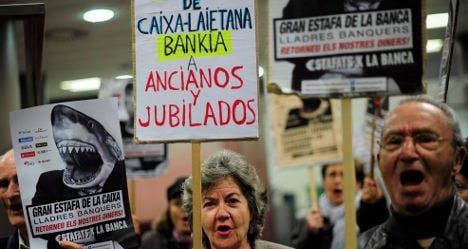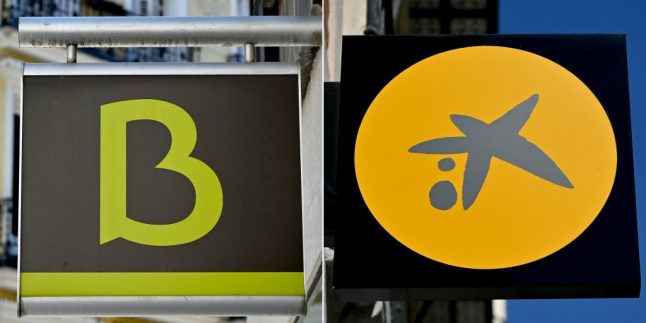The pensioners, and many thousands like them across Spain, say they unwittingly became holders of complex and risky "preference shares", which their banks had assured were as safe as a savings deposit.
Those preference share investments quickly became a costly trap.
Spanish banks' balance sheets were strewn with red ink after a 2008 property crash, forcing Spain to prop them up with €42 billion ($54 billion) in rescue loans offered last year by its eurozone partners.
As one of the conditions of extending the rescue funds, Brussels demanded that holders of preference stock share in their banks' losses.
"This is shameful! The government knows that Bankia has swindled pensioners," said 70-year-old Antonio Rodriguez as he protested in Madrid's central Puerta del Sol square outside a branch of the former savings bank Caja Madrid, which merged with six other regional savings banks to form Bankia in 2010.
Rodriguez said he poured €72,000 into preference shares in Caja Madrid in 2009 after being told by his bank manager that it was a "safe" product that would deliver a 7 percent annual rate of return.
"If he had told us that we risked losing everything, we would never have signed," he said.
After Spain's decade-long property bubble burst in 2008 sending the economy into a tailspin, savings banks sank into a sea of toxic property loans and they stepped up their marketing of preference shares as they tried to boost their solvency ratios to meet stricter regulatory demands.
Nearly one million Spanish depositors, many of them pensioners, poured money — in some cases their entire life savings — into preferred shares issued by their banks, according to banking consumer association ADICAE.
"No other European country sold preferential shares to small savers. The pressure of the banking lobby in Spain is enormous," said ADICAE spokesman Fernando Herrero.
But as Spain's economic downturn deepened the value of the preferred shares plunged and it made it effectively impossible to resell them.
Small investors bought €30 billion in preferred bank shares, which are not protected by the government's deposit guarantee fund, according to ADICAE.
Bankia, the largest of four lenders which the government was forced to nationalize, alone has €3.9 billion of preference shares distributed among tens of thousands of its clients while Banca Civica, which was bought by larger rival La Caixa last year, has €9.0 billion.
"Bankers needed to take money where they could find it, which is in the hands of old people who are the biggest savers," said 75-year-old Antonio Baraona Ortiz, one of the protesters outside of Caja Madrid in Puerta del Sol.
"I worked at night. We raised four children. We made a lot of sacrifices to save €68,000 and they have stolen it all," he added.
The European Union, which last year agreed to lend Spain up to €100 billion to help the country shore up its banks, has insisted that bank customers who bought preferred shares would have to absorb losses.
Spain has so far received €41.4 billion from its eurozone partners to fix its troubled financial industry.
Numerous legal cases have been brought by bank clients who allege they were sold risky products as secure deposits and some have succeeded in winning their money back.
This month, the Spanish ombudsman's office recommended that all banks that received state aid such as Bankia undergo "universal arbitration" regarding the sale of preference shares.
The ombudsman's office has received 1,274 complaints over the sale of preferred bank sales since 2011, most from elderly bank clients.
Finance Minister Luis de Guindos has said preference shares should never have been sold to retail savers but he backs arbitration only in cases where it can be shown that "buyers did not understand what they were buying".
Nemecio Martin, a 70-year-old pensioner who invested €42,000 in preference shares, which he had planned to use to pay for his stay in a retirement home, is anxiously waiting for a solution.
"If I can't pay, where will I go? Will I wait under a bridge to die?," he said.




 Please whitelist us to continue reading.
Please whitelist us to continue reading.
Member comments